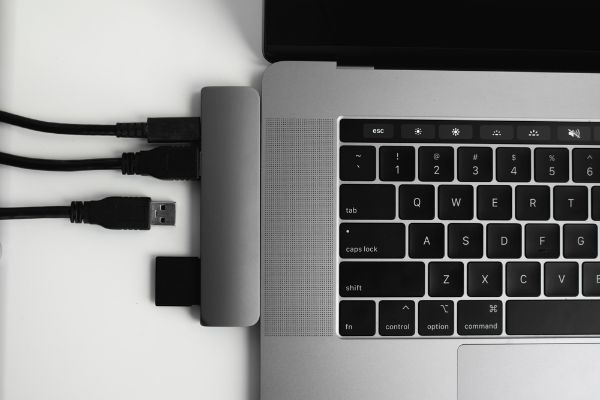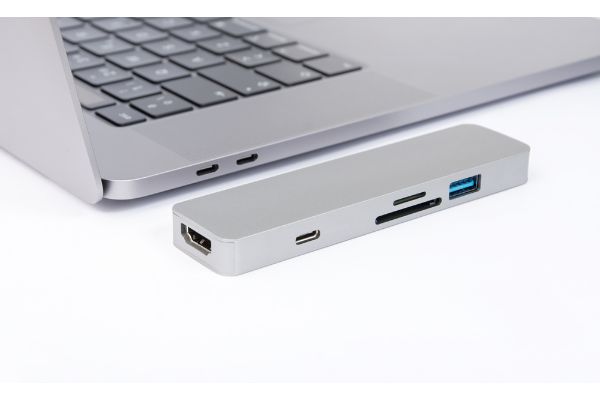Disclaimer: This post may contain affiliate links, meaning we get a small commission if you make a purchase through our links, at no cost to you. For more information, please visit our Disclaimer Page.
Laptops are great tools for giving us nearly all the computing power of desktop PCs in forms that are somewhat more portable. Some good laptops can rival some of their desktop counterparts, especially if you’re just after enough computing power for basic work tasks, internet browsing, downloading, and other things.
Some laptops are absolute powerhouses that can handle resource-intense programs, but you may find that you don’t have enough ports to accommodate everything that you want to plug into yours.
This is where USB-C hubs come into play. With a hub like this, you can have access to additional ports that your native laptop may not support. Laptops seem to be getting more powerful, but they are also thinner, and this form factor limits how many ports they can have.
We’ll discuss in some detail how safe USB-C hubs are, whether they need access to power in order to function, talk about any possible performance issues, and a few other questions users might have in our article on this topic.
Table of Contents
Are USB-C Hubs Safe?
As with many questions in the tech world, this one is both a yes and no. It depends on what type of USB-C hub you get and how you plan to use it. Most of the time, a USB-C hub is perfectly safe to use.
After all, it is just a way to give your computer more connectivity options, thus giving you greater flexibility over what you can plug into and run from your computer.
As long as you use a hub of decent quality from a reputable brand, you should not encounter any issues when the device is connected to your laptop.
If you’re using a low-quality device, it is possible that a powered one can cause some back-and-forth issues between the hub and the computer. In most cases, this is an issue that can cause some kind of short or fault that may damage your rig, but that is not a certainty.
It is always a good idea to spend a bit of money to get something decent that should work out of the box and has its own warranty coverage.
However, that is not to say that all inexpensive brands or models of USB-C hubs should be written off completely. Many of them can work fine.
For the most part, you just have to be mindful of user error when you are plugging or unplugging the hub from your computer.
Just like with external hard drives, it is a good idea to plug them into the appropriate port gently but firmly, and you should do so in a straight line without rubbing the connector against the inner sides of the port unnecessarily.
The other common issue related to USB-C hubs happens when it sends a burst of power that overloads things. Again, for the most part, you can mitigate this risk by purchasing a decent product that is verified.
Do USB-C Hubs Need Power?
When we talk about power needs here, we’re referring to a USB-C hub that might use external power from the mains. Any USB-C hub will at least draw power from the computer itself once you plug it in, but, as a rule, these are not what we call powered USB-C hubs.
The short answer is no, USB-C hubs do not need power.
However, it is important to talk about some differences between powered and unpowered hubs, too.
If you purchase a USB-C hub that is unpowered, that just means that it will draw its energy from the laptop battery, and every device plugged into it will share the maximum load it can provide.
This means that for small peripherals like mice, keyboards, some chargers, or flash drives, an unpowered hub might be suitable for your needs.
However, although USB-C hubs don’t need power, you do need to have that option if you’re running a lot of devices that require more output than the unpowered hub can provide.
For example, if you need to operate devices that go beyond the maximum allowable voltage of the unpowered hub, it is a good idea to look into a powered one. Printers or scanners are just two kinds of devices that might fit into this category, and some external hard drives probably will, too.
You can decide on what your needs are, and that can help you make an informed decision as to which kind you should buy. A powered hub will come with its own adapter.
Does a USB-C Hub Affect Performance?
While it is not necessarily a given, a USB-C hub can affect the performance of your machine and its attached devices. There are a few ways that it might do this:
1. Battery power could become an issue if you are plugging an unpowered hub into your laptop. This probably isn’t too noticeable if your laptop is plugged into its own power source, but you may notice a dip in how much power is available as a percentage of the total battery.
This can occur even when its status is plugged in and charging. If you are using a hub with your laptop unplugged, you could see the battery drain quicker than usual.
2. The ports on your laptop are connected to your motherboard, and they have a set bandwidth that they will parse out to attached devices. A hub with multiple ports in it, once plugged into the computer, will have the available bandwidth spread out over each of those ports.
3. Functionally, there is a limit on how many devices the USB-C port can support. This is not just in terms of how many ports are available on the physical unit, either. The hub provides data streams between your laptop and connected devices.
If some of the devices are already using as much data as the hub can transfer, additional devices that you plug in will not be able to make use of a USB-C.
Is It Normal for a USB-C Hub To Get Hot?
Some users worry that their USB-C hubs are getting hot during use. Before we continue, we should say that it is perfectly normal for hubs to feel warm or even a bit hot when they are handling several devices.
As with many electronics, there are active circuits inside that have power running through them, and as the hubs are working, things are getting warmer. Could your USB-C hub be getting too hot, though?
The answer to this question can depend on the make and model of the hub you choose. As a general rule, it is normal for USB-C hubs to feel hot to the touch. This can be true even if the device is plugged in but has few or no peripherals plugged into its own ports.
Sometimes, we can be bad at judging whether some electronics are too hot, and that is why you should check the recommendations for the model you buy.
Most manufacturers will tell you the upper range of temperatures at which the device should operate without problems. It should be fine as long as it is in this range, even if it feels warm to you.
To find the range of temperatures, it’s usually listed in a manual that comes with your USB-C hub or it’s on the manufacturer website in the specific product’s details.
Why Are There So Few USB-C Hubs With Multiple USB-C Ports?
There are a couple of technical reasons why it’s hard to find USB-C hubs with multiple USB-C ports attached to them. First, a special chipset is necessary to give the current USB-C hubs the functionality they need in order to support the types of hardware interfaces that they do.
Namely, manufacturers and developers wanted to be able to support both Thunderbolt and USB 3.1 at the same time. Inexpensive versions of the chipsets needed for this aren’t widely available just yet. Therefore, there are not many options for hubs with multiple USB-C ports.
Second, the power delivery systems available for USB-C hubs might go up to 20 volts and 100 watts. If you put too many USB-C ports with power delivery on one hub, you’ll be drawing a lot of amps very quickly, and this could lead to yet more issues.
Can You Connect Two USB-C Hubs Together?
Yes, it is possible to connect two hubs together. While there is not much to this, it is a good idea to make sure that both of them are of the powered variety instead of the unpowered one. If they were unpowered, the available wattage to both hubs and all the attached devices might be too low to get the support for the peripherals that you want.
Conclusion
Having lighter, thinner laptops is great for portability. However, it can be a detriment when you’re someone who needs to plug in and run quite a few other devices off of or in conjunction with your computer.
To deal with a lack of ports, the USB-C hub can give you the best of both worlds, allowing you to enjoy your smaller laptop and maintain connectivity options at the same time.
Just remember not to plug too many high-powered things into one unpowered hub, and make sure you know which kind of hub will work best for your needs.


